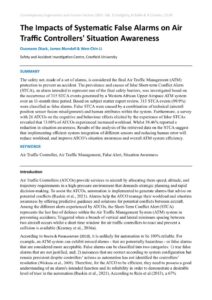| Document | Author Ousmane Diack, James Blundell & Wen-Chin Li |
| Abstract The safety net, made of a set of alarms, is considered the final Air Traffic Management (ATM) protection to prevent an accident. The prevalence and causes of false Short-term Conflict Alerts (STCA), an alarm intended to represent one of the final safety barriers, was investigated based on the occurrence of 315 STCA events generated by a Western African Upper Airspace ATM system over an 11-month time period. Based on subject matter expert review, 313 STCA events (99.9%) were classified as false alarms. False STCA were caused by a combination of technical (aircraft position sensor fusion misalignment) and human attributes within the system. Furthermore, a survey with 26 ATCOs on the cognitive and behaviour effects elicited by the experience of false STCAs revealed that 73.08% of ATCOs experienced increased workload. Whilst 38.46% reported a reduction in situation awareness. Results of the analysis of the retrieved data on the STCA suggest that implementing efficient system integration of different sensors and reducing human error will reduce workload, and improve ATCO’s situation awareness and overall ATM system efficiency. |

